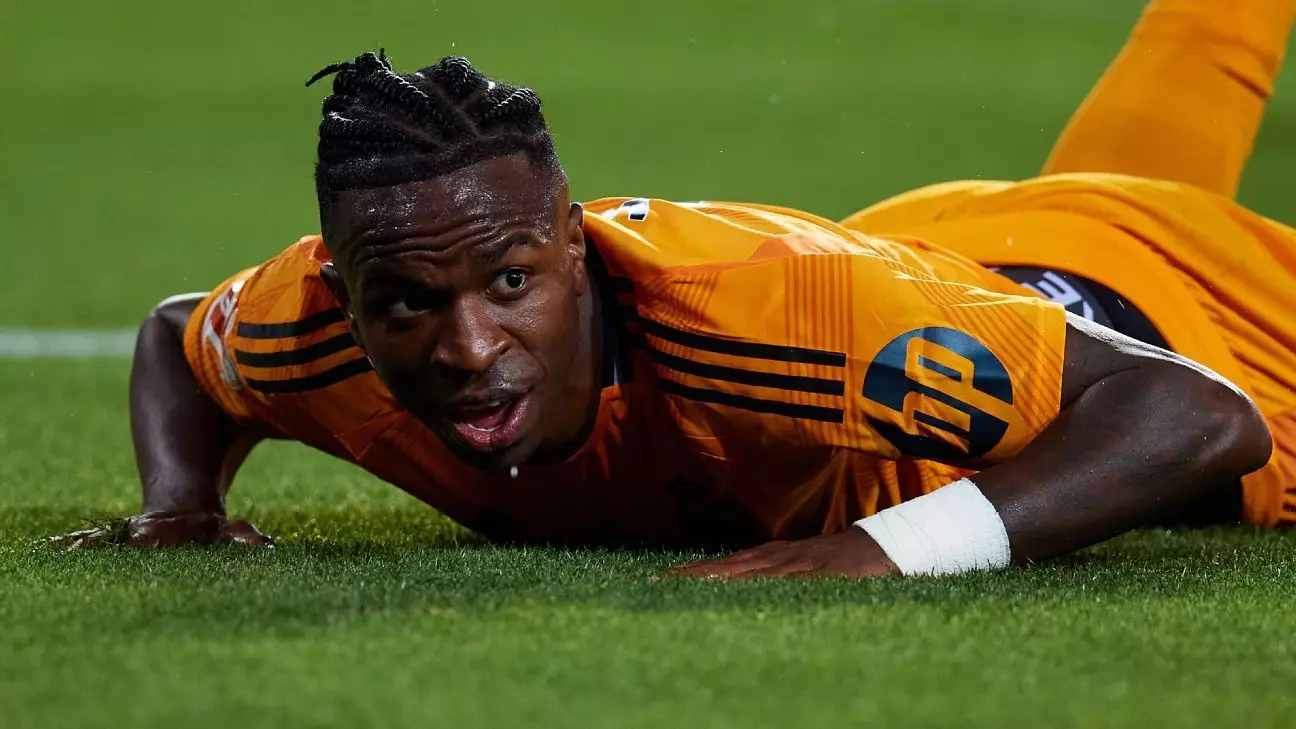Football is a beautiful game, filled with passion, rivalry, and a host of characters, each with their own story. One such character is Vinicius Junior, a Brazilian footballer who has captured the imaginations of fans across the globe through his dazzling skills and electric pace. However, alongside the admiration, Vinicius has found himself grappling with frustration and unfair treatment, particularly from the media and fans alike. This article delves into the ongoing issues surrounding Vinicius, examining not only his disciplinary challenges but also the broader context of his experiences as a Black footballer in Spain.
Vinicius’ recent red card during a match against Valencia has sparked significant debate. While an appeal has been lodged by Real Madrid, the incident led to a two-match suspension for the young forward. Despite his relatively low number of red cards—just two in nearly 300 appearances for his club—Vinicius finds himself under a lens of criticism that seems disproportionate compared to his peers. Sergio Ramos, for example, accumulated ten red cards by the same age, yet was often portrayed as a passionate warrior rather than reckless. The underlying question is why Vinicius receives harsher scrutiny for seemingly minor indiscretions.
This disparity can be attributed to systemic biases present in football culture. While Ramos’ aggressive style was often normalized as part of his identity, Vinicius is frequently labeled as immature and overly emotional. The critique he faces tends to overlook the context in which these reactions occur. It must be noted that his disciplinary infractions primarily stem from reactions to provocation rather than outright fouling opponents. Such a distinction raises questions about how emotional responses are perceived differently based on the player’s background, skin color, and national origin.
Racism is a deeply rooted issue in many sports, and football is no exception. Vinicius has been subject to various forms of abuse, including racially charged insults, which have intensified around matches. This hostile environment undoubtedly weighs heavily on him, affecting his mindset both on and off the pitch. Comparatively, Ramos—who navigated his career with a much different narrative—was largely shielded from such experiences.
The media portrayal of Vinicius often exacerbates his situation. Rather than being celebrated for his talent and contributions to Real Madrid’s successes, he finds himself the subject of intense scrutiny and harsh judgments. Fellow players and coaches, including Carlo Ancelotti, have acknowledged the challenges he faces and the marked improvement in his approach. Yet, the public narrative often focuses on errors rather than growth, holding Vinicius to an unrealistic standard while overlooking his achievements.
As a young athlete rising to fame in a pressure-cooker environment like La Liga, Vinicius is trying to manage not just his on-field performance but the immense expectations that accompany it. These pressures become manifold when you consider his background. Coming from humble beginnings in Brazil, Vinicius has transformed into one of football’s hottest properties. The weight of expectation can be staggering, prompting athletic responses that may not always align with good judgment.
Ancelotti’s acknowledgment of the difficulties faced by Vinicius highlights that he is maturing and learning to navigate the storms of top-tier football. With each match, the Brazilian’s growth as a player and individual becomes more evident. Nevertheless, the continued emphasis on his flaws rather than his progress can potentially send him into a spiral of self-doubt. His ability to translate pressure into performance remains a fine line to walk.
The role of the media in shaping narratives around athletes cannot be underestimated. The sensationalist coverage and the “us vs. them” mentality can fuel division and lead to heightened emotions during matches. When pundits and commentators amplify negativity, young athletes like Vinicius can feel isolated and unfairly targeted. This dynamic not only damages individual careers but also affects how younger generations perceive the game.
Real Madrid’s own media platform has also played a role, often amplifying the outrage surrounding contentious incidents. Such portrayals can worsen a player’s state of mind, resulting in further issues on the pitch. The club must address this and strive to create a more supportive environment, fostering positivity that aids in the player’s mental and emotional stability.
Vinicius Junior represents not just a remarkable talent but also the complexities faced by modern athletes, particularly those from marginalized backgrounds. While disciplinary actions and critical media narratives may target him, the focus should instead pivot towards recognizing his extraordinary contributions to the game. Emphasizing empathy, promoting understanding, and diffusing tension can contribute to a more supportive atmosphere for players like Vinicius, allowing them to truly shine on the world stage. The time has come for fans, media, and clubs alike to reconsider how they engage with and support their chosen players, moving towards a culture that values excellence while acknowledging humanity.

Leave a Reply